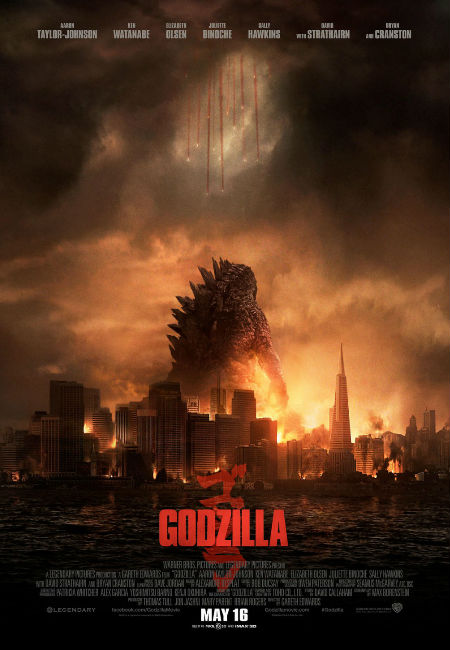
When one of the characters in a movie blithely states near the start of a blockbuster monster movie, “It’s not the end of the world”, as Elle Brody (Elizabeth Olsen) does when locked in an embrace with husband, and hero of the 2014 iteration of Godzilla, Ford (Samuel Taylor-Johnson), then you can pretty sure that’s exactly what it is going to be.
Or at the very least, that everything has the potential of being sent back to the Stone Age, as Ford’s one-man band crusading physicist father Joe (Bryan Cranston in sterling form), rather graphically predicts at one point.
With all those inadvertent or quite deliberate doomsayers close to him, and the gathering storm clouds of monster genre oblivion hovering menacingly above, you could be forgiven for wondering how Ford, who has known some heartache in his life but is now happily married to Elle and father to adorable son Sam (Carson Bolde), finds any real peace.
But find it he does in small, precious moments when he’s home from overseas rotations as a lieutenant in the navy where he works as an explosive ordnance disposal technician, doing his best to forge the kind of Hallmark family-esque life denied him by a pivotal event in his childhood.
Desperate to hang tight to these fleeting snatches of domestic bliss, he is naturally resistant to his father’s constant entreaties to come with him to investigates troubling anomalies near the site of a nuclear meltdown in Janjira, Japan, which saw the area closed to everyone but the military and some scientists many years before.
Forced to spend some father/son bonding time in Japan after his dad is arrested for the umpteenth time crossing into the supposedly heavily radioactive zone in Janjira, Ford is sent on the sort of unwilling hero roller coaster ride we have seen a thousand times before in many blockbusters.
The difference this time is that for all the standard tropes in use, of which the unsuspecting but capable hero is most certainly one, Godzilla is not indebted to them.
Indeed, in the hands of Gareth Edwards, whose restraint and subtlety, two words you don’t see associated with the monster genre all that often, if at all, saw Monsters (2010) re-define the genre, they become tools in a tale that is as marked by intelligence and nuance as it is the customary destruction and epic battles.
This is thanks just as much to the finely constructed story and screenplay by David Callaham and Max Borenstein respectively who go to great lengths to not let Godzilla completely define the film.
This may seem like an odd ambition in a movie which quite obviously bears his name, but their heavy focus on Ford, his wife, son and father, and on the many well-etched characters such as Dr Vivienne Graham (Sally Hawkins) or David Strathairn’s Admiral William Stenz, USN who populate the movie, shifts the centre of the film’s gravity onto the people affected by the appearance of Godzilla, just as much on the legendary monster himself.
And that matters greatly, as does the provision of a scientifically-feasible (if not wholly accurate I am guessing) origin story for Godzilla and other kaiju, and the depiction of a military apparatus that acts in a considered and strategic manner, shorn of the bumbling Keystone Cops-like behaviour they have been saddled with in countless movies of this ilk, because it gives us a film that doesn’t collapse under the weight of its own blockbuster-iness.
Yes, it probably has a few too many emotionally-overwrought scenes that could have been plucked from any of its predecessors but these are more than ably countered with the sort of emotional depth, layered characterisation (of monster as much as man if you can believe it) and realistically-wrought city-destroying battles (albeit ones that largely take place at night making it a tad difficult to always make out what’s happening) you don’t usually see in features from this genre.
And, of course, it retains the all important core message that we mess with this planet and the precious balance of nature at our peril; specifically that our over-reliance on all things nuclear may not be the saving grace in a climate change-blighted age that we think it is.
A learned Oscar-worthy movie in the vein of 12 Years a Slave it is not, but then you don’t expect monster movies to occupy that sort of rarefied ground.
Rather what Godzilla, which has been released in the 50th anniversary year of the monster’s enduring insertion into the world’s pop culture consciousness, manages to do is what many might consider the near-miraculous.
It is, counter to expectation, a monster movie with intelligence and subtlety that remembers, where many of its blockbuster brethren forget, that people and story matter every bit as much as CGI and bombastic battles.
Gareth Edwards expertly balances all these elements, crafting in the process a film that not only honours the legacy of Godzilla in an impressive way, but gives us too a thoroughly enjoyable movie whose impact will resonate far beyond the time it takes to consume the popcorn and soda which most people will inevitably consume while watching it.